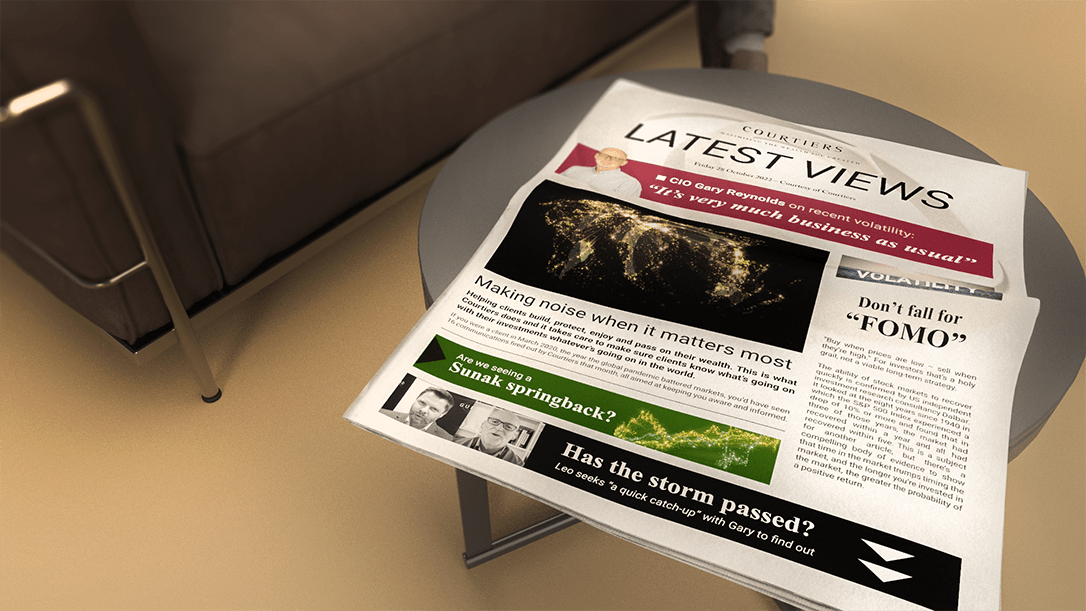After the demise of Trussonomics, the worst is probably over, says CIO Gary Reynolds as he runs a critical eye over the economic and tax polices of Rishi Sunak’s new government. He assesses the performance of the Courtiers Funds and explains how avoiding long dated bonds helped the Investment Team to navigate the recent storm and how it’s now moving to take advantage of lower prices.
LH: I just wanted a quick catch-up to understand what’s been happening over the last week. How have markets been since Rishi Sunak’s appointment? Are we seeing a “Sunak springback”?
GR: Following the reaction to Kwasi Kwarteng’s initial mini-Budget, the Conservatives have been forced kicking and screaming towards a more prudent fiscal stance. On the news that Rishi Sunak was to be the next Prime Minister, interest rates declined and the market responded very positively. Only time will tell, but short term, long interest rates have calmed down a lot.
I didn’t think that the Kwarteng mini-Budget was the disaster everybody said it was. I think it was a genuine effort to get some improvements in productivity and economic growth that have been sadly lacking in the past 10 to 12 years. If there’s a criticism of Sunak, it’s that there’s a risk that we return to the Osborne austerity days. The Conservatives are certainly taking a very different approach compared to the one taken by Liz Truss and Kwasi Kwarteng.
LH: Thank you – Gary, can you just summarise for us how Courtiers has navigated through this recent period of volatility and whether it’s impacted on the investment strategies that you’re putting in place right now to help mitigate against risk for clients?
GR: If you hit a storm with your sails up and your portholes open, then you’re gonna get wet, so a lot of investment groups suffered. We hit this particular storm with no long dated bonds in the portfolio and that meant that we came through relatively unscathed. In fact, as interest rates have risen, we’ve been able to take advantage of much lower prices and started buying long dated bonds. One of the things I look for when we get these crises is how did our Cautious Fund do, because it’s meant to be more defensive. This year it’s been extraordinarily defensive and it’s doing extremely well against its peer group. Equities are off this year, so perhaps our Growth Fund, which is designed to achieve above average long-term growth isn’t going to fare as well as those funds meant for investors that want less risk.
Because a lot of share prices have sold off, and the pound and long bonds have sold off, they have become better assets for the long term, and we’re starting to buy them. But that’s not anything particularly clever. It’s what we always do. So, for us, in a way it’s a different crisis, but it’s very much business as usual.
LH: Do you think the storm has passed?
GR: This year, we’ve seen a massive rewriting of both equities and bonds. Long dated bond yields are getting back somewhere near their 300-year average. In the futures market the price of energy has been coming down, oil prices are way below their peak, and you can be pretty sure that the Europeans have been storing up large amounts of energy to see them through the winter. There may be one or two wobbles, but my view is that the worst is probably behind us.
LH: Is there anything you’d like to see or hear in the forthcoming fiscal statement due on November 17?
GR: I’d like Jeremy Hunt to announce when he’s going to bring corporation tax rates back down again. The government has been encouraging companies to invest, but it’s taking another 6% of their profits in corporation tax, that’s hardly the way to encourage them to invest.
And I ‘d also like him to deal with the anomaly that whacks a huge amount of tax – an effective tax rate of 60%, on those earning between £100,000 and £150,000. That’s crazy.
We’re experiencing the longest period of tax and spend governments that we’ve ever had – and that’s under a Conservative administration. So, I’d also like him to announce that once the country’s finances are back in balance that we’re going to see a reduction in taxation.]
I fundamentally believe that the country is better off when people are spending their own money rather than giving it to the government to spend it for us. If there’s no change in that, then at the next election, it doesn’t really matter who you pick, you’re gonna get the same policies and everybody would have moved to this kind of left-of-centre position.
LH: We’ll see. Gary thanks again for your time and I’ll look forward to catching up again soon.
We’ll be reviewing and reporting on that fiscal statement once it’s out on November 17. If you’ve any questions please let us know via the website or your Adviser, and we’ll get them to the right people.













